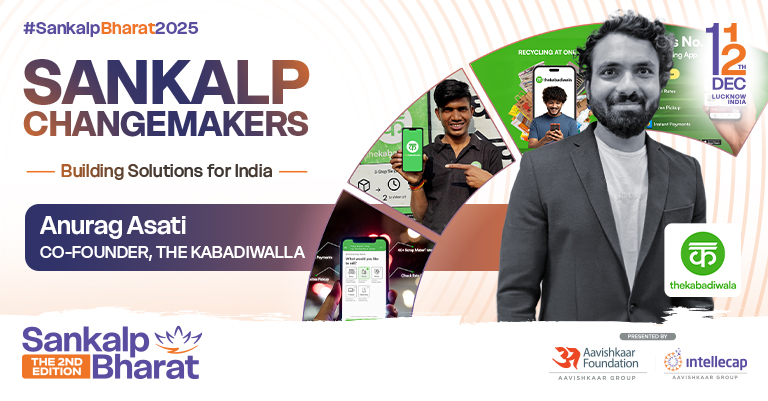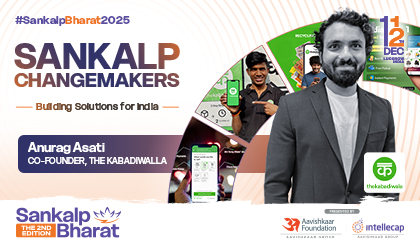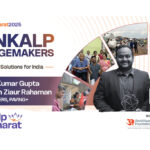

From college frustration to organizing India’s waste economy: #SankalpChangemakers features Anurag Asati, Co-Founder, The Kabadiwala
When Waste Becomes Wealth
During his college days, Anurag Asati faced a seemingly simple problem that would reshape his life’s mission: he struggled to sell household recyclables. What should have been a straightforward transaction—exchanging old newspapers and scrap materials for money—became a frustrating encounter with an unorganized, opaque system.
But that personal struggle sparked a vision that would eventually transform how millions of Indians think about their discarded materials.
From College Problem to National Solution
In 2014, Anurag Asati co-founded The Kabadiwala alongside Kavindra Raghuwanshi. Starting in Bhopal, what began as a tech-enabled system for scrap collection has grown into a platform that serves a dual mission: bringing transparency and convenience to recycling for consumers while empowering kabadiwalas and waste pickers with digital tools, better incomes, and formal recognition.
The company has built a hybrid tech-enabled model that includes a User App allowing households and businesses to schedule scrap pickups, check live rates, and track their recycling impact, and a Partner App (Scrapr) that digitizes processes for kabadiwalas and scrap dealers with electronic weighing, transparent pricing, and pickup management.
Scale Through Smart Integration
Today, The Kabadiwala serves more than 4 lakh consumers and works with over 500 corporates and brands including Adani, Reliance, Tetra Pak, Sleepwell, and Nippo. The company operates in 15 cities through a clever hybrid model, in metro cities like Delhi NCR, Mumbai, Bangalore, Hyderabad, and Pune, they work with local kabadiwalas using their Partner App. In cities like Bhopal, Indore, Lucknow, Nagpur, Raipur, Aurangabad, and Ahmedabad, they manage end-to-end collection through their own vehicles, warehouses, and Material Recovery Facilities.
This combination allows them to scale quickly in metros while maintaining deep operational control where they directly manage infrastructure—a strategic approach that balances growth with quality.
Building the Ecosystem
The Kabadiwala has onboarded more than 5,000 kabadiwalas and directly supports over 750 waste pickers with higher earnings )—safety equipment, and digital tools. They run and manage Material Recovery Facilities (MRFs) in multiple cities, channeling collected recyclables to authorized paper mills, plastic recyclers, metal smelters, and glass units to ensure complete traceability.
Municipal partnerships span Bhopal, Ayodhya, Indore, Raipur, and Lucknow, strengthening door-to-door collection, recovery centers, and public awareness campaigns. On the corporate side, they deliver Extended Producer Responsibility (EPR) compliance and circularity projects for brands seeking plastic neutrality and large-scale take-back programs for packaging, mattresses, and batteries.
Capital and Growth
The company has raised capital from institutional and strategic investors, like Roots Ventures, . In and Hindustan Foods Limited , one of India’s largest consumer goods contract manufacturers. This partnership goes beyond funding, providing strategic alignment with leading FMCG brands on sustainability and recycling initiatives.
The funds are being deployed to expand operations across key cities, strengthen the technology stack, and deepen circular economy projects with corporates and municipal partners.
Impact at Scale
The numbers tell a compelling story: The Kabadiwala collects and processes over 500 tonnes of recyclables every month, preventing them from ending up in landfills. Their operations have saved 10,243 trees, 565,536 kWh of energy, 13.8 crore litres of water, and 2.5 lakh litres of oil.
But perhaps more significant is the human impact—over 5,000 kabadiwalas onboarded and 750+ waste pickers supported with increased incomes (typically 30-40%) and better working conditions. Every kilogram of waste is digitally tracked from pickup to recycler, improving efficiency, reducing leakages, and ensuring compliance for both consumers and corporates.
Innovation in Integration
The Kabadiwala’s technology differentiation lies not just in creating apps, but in bridging formal and informal systems. Their dual-app approach—User App for consumers and Partner App for kabadiwalas—includes e-weighing, transparent pricing, and route management. Smart MRFs use balers, conveyors, and IoT-enabled weighing systems to improve segregation quality and recycling efficiency.
The innovation extends to EPR and Circularity Programs, providing the technology backbone to run large-scale take-back programs for packaging, mattresses, batteries, and more, helping brands meet regulatory and sustainability goals.The Kabadiwala operates on a simple but powerful premise: integrating millions of small, unorganized collectors into a formal digital ecosystem, turning them into empowered micro-entrepreneurs. Their approach proves that technology can organize without displacing—digitizing traditional systems rather than replacing them.
Anurag Asati, recognized as a finalist at the Sankalp Bharat Awards 2024, demonstrates how personal frustrations can become systemic solutions. The Kabadiwala proves that organizing India’s informal economy isn’t about replacing traditional workers—it’s about giving them the tools, recognition, and earning potential they deserve.
Follow #SankalpChangemakers for more stories of entrepreneurs redesigning India’s future.




